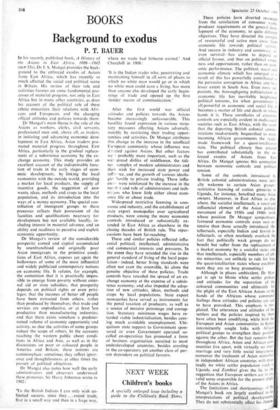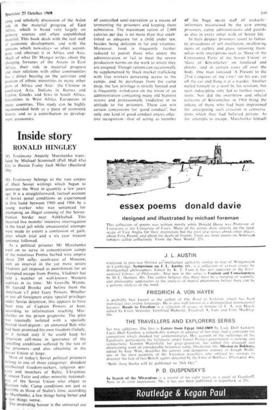BOOKS Background to exodus
P. T. BAUER
In his recently published book, A History of the Asians in East Africa, 1886-1945 (ouP 55s), Dr J. S. Mangat provides the back- ground to the enforced exodus of Asians from East Africa, which has recently so much affected the social and political scene in Britain. His review of their role and activities focuses on some fundamental pro- cesses of material progress, not only in East Africa but in many other countries, as does his account of the political role of these ethnic minorities, their relations with Afri- cans and Europeans, and the changing official attitudes and policies towards them.
Dr Mangat's main theme is the role of the Asians as workers, clerks, civil servants, professional men and, above all, as traders, in initiating and advancing economic deve- lopment in East Africa. Asian traders pro- moted material progress throughout East Africa, particularly in the gradual replace- ment of a subsistence economy by the ex- change economy. This study provides an excellent account of the indispensable func- tion of trade in the early stages of econ- omic development, by linking the local economies with the outside world, providing a market for local products, the supply of incentive goods, the suggestion of new wants, ideas, methods and crops to the local population, and its introduction into the ways of a money economy. The special con- tribution of immigrant groups to these processes reflects their possession of the faculties and qualifications necessary for development but not available locally, in- cluding interest in material advance, and an ability and readiness to perceive and exploit economic opportunity.
Dr Mangat's review of the considerable prosperity earned and capital accumulated by unenfranchised and originally poor Asian immigrants in the primitive condi- tions of East Africa, exposes yet again the hollowness of some of the most influential and widely publicised contemporary notions on economic life. It refutes, for example, the contention that it is practically impos- sible to emerge from poverty without exter- nal aid or state subsidies; that prosperity depends on political rights or even privi- leges; that the incomes of better off people have been extracted from others, rather than produced by themselves; that trade and services are unproductive, or at least less productive than manufacturing industries; and that there exists somehow a predeter- mined volume of economic opportunity'and activity, so that the activities of some groups reduce the scope of others. In the accounts reaching the western public about condi- tions in Africa and Asia, as well as in the discussions on poor or coloured people in America and Britain, these notions are commonplace; sometimes they reflect ignor- ance and thoughtlessness, at other times the pursuit of political objectives.
Dr Mangat also notes how well the early administrators and observers understood these processes. Sir Harry Johnston wrote in 1902: To the British Indians I can only wish un- limited success, since they ... create trade, first in a small way and then in a large way,
where no trade had hitherto existed.' And Churchill in 1908:
'It is the Indian trader who, penetrating and maintaining himself in all sorts of places to which no white man would go or in which no white man could earn a living, has more than anyone else developed the early begin- nings of trade and opened up the first slender means of communication.'
After the first world war official attitudes and policies towards the Asians became increasingly unfavourable. This hostility found expression in various statu- tory measures affecting Asians adversely, notably by restricting their trading oppor- tunities and activities. Dr Mangat attributes this change to the increase in the unofficial European community whose influence was d•r.cted against Asians. But other factors we • probably more important, such as the wic'cspread dislike of middlemen, the tidi- nes complex of modern administrators and their wish for increased state power and infl:!- ice, and the growth of various ideolo- gic, hostile to private trading. These influ- enco were reinforced by the increase in the nor 11,-r and role of administrators and tech- n■cians who knew little either about econ- omic life or about trade.
Widespread restrictive licensing in com- merce and industry, and the establishment of state export monopolies over agricultural products, were among the many economic controls introduced or substantially ex- tended in East Africa as elsewhere in the closing decades of British rule. The reper- cussions have been far-reaching.
These and similar policies reflected influ- ential political, intellectual, administrative and commercial interests and pressures. In the event they have retarded the rise in the general standard of living of the local popu- lation—indeed, better living standards were often not even the ostensible, let alone the genuine objective of these policies. Trade controls have retarded the spread of an ex- change economy at the expense of a subsis- tence economy, and also impeded the adop- tion of new attitudes, ideas, methods and crops by local populations. State export monopolies have served as instruments for the penal taxation of producers, as well as a source of massive patronage and corrup- tion. Statutory minimum wages have re- tarded viable industrialisation, besides caus- ing much avoidable unemployment. Ubi- quitous state support to Government spon- sored or even Government operated so- called co-operatives has promoted a form of business organisation unsuited to most underdeveloped countries, besides creating in the co-operators yet another class of per- son dependent on political favours.
These policies have diverted resources from the satisfaction of consumer wants, producer requirements or the general deve.
lopment of the economy, to quite different objectives. They have directed the enereie, of resourceful and active men away from economic life towards political acthin, And success in industry and commerce—or even survival—has come to depend on official favour, and thus on political astute- ness and opportunism, rather than on econ- omic performance. The political, social and economic climate which has emerged as a result of this has powerfully contributed to the pervasive corruption in Africa and to a lesser extent in South Asia. Even more im- portant, the thoroughgoing politicisation of economic life has inevitably heightened political tensions, for when government i, all-powerful in economic and social life, it becomes a matter of life and death in %%hose hands it is. These corollaries of extensive controls are especially evident in multi-racial societies such as East Africa, with the result that the departing British colonial admini- strations inadvertently bequeathed to many incoming African governments the ready- made framework for a quasi-totalitarian state. The political climate thus created has contributed substantially to the en- forced exodus of Asians from East Africa. Dr Mangat ignores this connection between economic controls and political tension.
Some of the controls introduced by British colonial administrations were initi-
ally welcome to certain Asian groups: restrictive licensing of cotton ginneries in Uganda, for instance, benefited many Asian owners. Moreover, in East Africa as else-
where, the socialist intellectuals, a vocal and influencial element of the Asian political movement of the 1930s and 1940s (with whose position Dr Mangat sympathisest favoured economic controls even mor ex-
tensive than those actually introduced. (In-
tellectuals, especially Indian and Jewish in- tellectuals, so often resolutely overlook the
fact that politically weak groups do not
benefit but suffer from the replacement of a -Inarket economy by a socialist state: and 'that intellectuals, especially members of eth- nic minorities, are unlikely to rule for long the quasi-totalitarian states whose establish- ment they are so busy promoting.) Although in places ambivalent, Dr Man- gat is apt to blame white settler policies
and attitudes for the separation of the
coloured communities and ultimately for the plight of the East African Asians at the hands of the Africans whose communal
feelings these attitudes and policies are said to have provoked. This emphasis is mis-
pla'ced. The utterances and attitudes of the -settlers and the policies inspired by them have often been unedifying, while both the European and Asian communities in Kenya intermittently sought links with Afncan political groups to strengthen their position against the other. But the fact remains that. throughout Africa, Asian and African com- munities live apart, with virtually no inter- marriage and very little social intercourse. : moreover the treatment of Asian minorities in independent African countries with Ow' tically no white settler population (such a. Uganda and Zambia) gives the lie to the suggestion that European settlers are in an, valid sense responsible for the present plight of the Asians in Africa.
The limitations and shortcomings of D.r Mangat's book are largely confined to Ins interpretations of political developments They do not substantially affect his Mout ating and scholarly discussion of the Asian role in the material progress of East Africa. which is based very largely on primary sources and often unpublished material. This book deals with the real stuff of economic development, and with the tensions which nowadays so often accom- pany and obstruct it in Africa and Asia. Much of what Dr Mangat writes about the changing fortunes of the Asians in East Africa. their role in material progress and their relations with other communities has a direct bearing on the activities and position of ethnic minorities in many other parts of Africa and Asia: the Chinese in south-east Asia, Indians in Burma and Ceylon. Greeks and Jews in South Africa. Levantines in West Africa. Europeans in many countries. This study can be highly recommended both as a piece of economic history and as a contribution to develop- ment economics.



















































 Previous page
Previous page